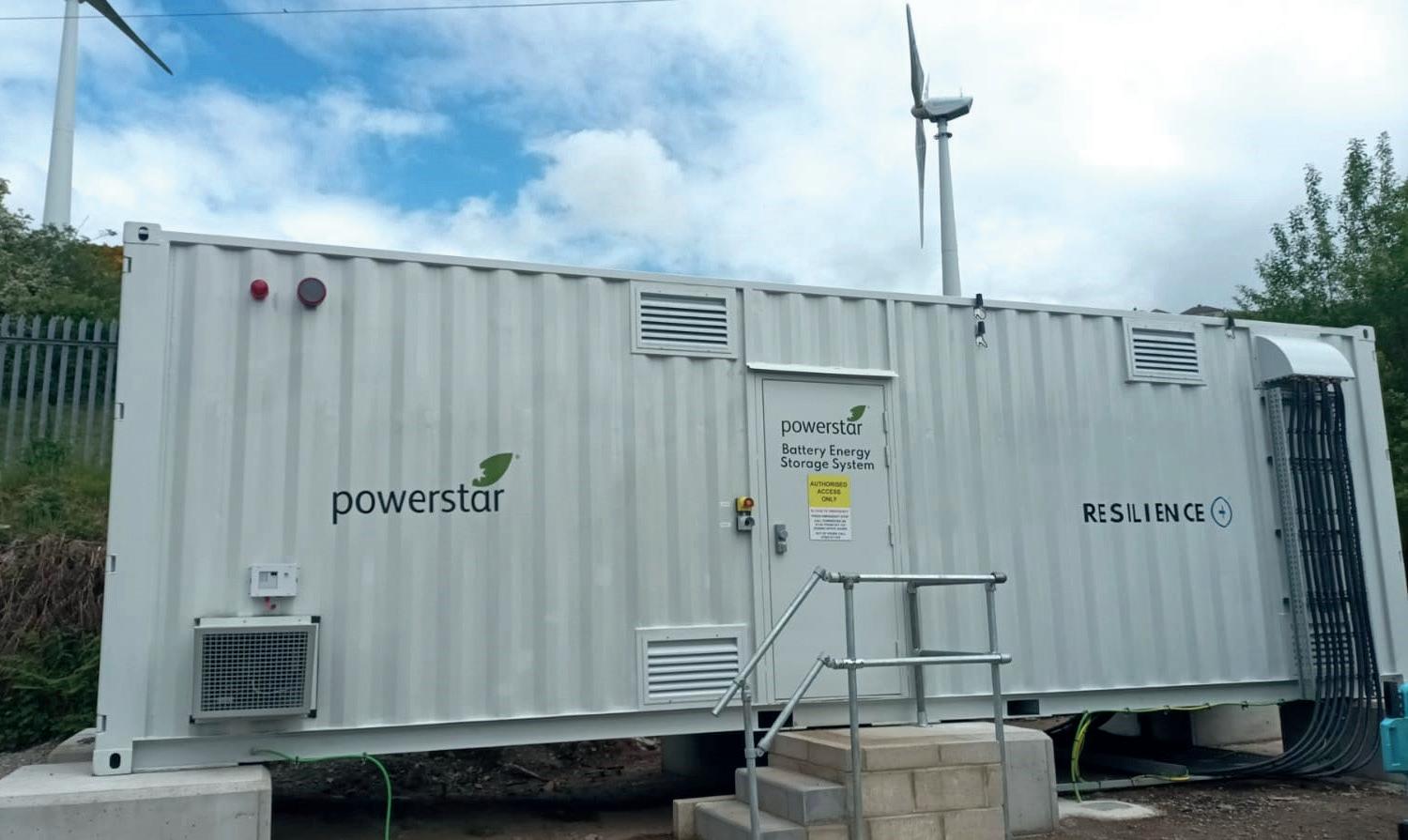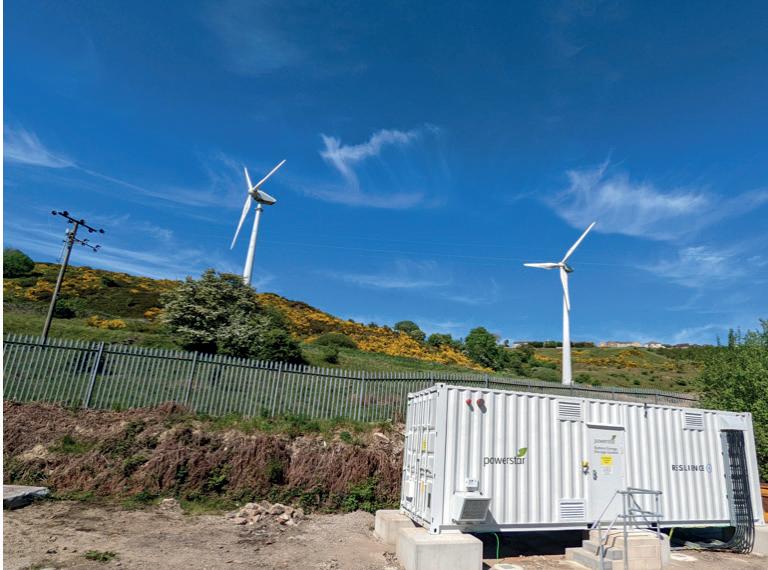
8 minute read
Decarbonisation: PSR
Sustainable business through the Energy Trilemma
British manufacturing is facing possibly the toughest winter in a century, with energy supply creating some of the most pressing issues. Alastair Morris* investigates the three arms of the Energy Trilemma and how ParkinsonSpencer Refractories is taking steps to address the issues for profitable and sustainable business.
The recent Business Energy Tracker report from npower Business Solutions highlights the issues and concerns of some of the top manufacturers and organisations across the UK.
The findings are stark, with energy overtaking Covid as the top business concern for 77% of businesses and now a board-level concern for over 80%.
That said, companies still want to take positive action towards sustainability, with net zero measures deemed a key investment priority for 55% of respondents across the next 12 months. In the context of the Energy Trilemma - affordability, sustainability and security of supply - the report’s findings are timely, especially for the energy intensive sector of ceramic and glass manufacturing.
Refractories and glass solutions provider, Parkinson-Spencer Refractories (PSR), has been operating from its Halifax, West Yorkshire, base for more than 220 years. It produces up to 1,500 tonnes of refractory products each year and supplies 78 markets globally.
Each aspect of the Energy Trilemma affects the business - as it does the whole of the UK’s economy. Despite the Energy Bills Relief Scheme, fixing gas and electricity prices for business until April (at the time of writing), many companies - and manufacturers in particular -
� Left. Alastair Morris, Chief Commercial Officer, Powerstar. � Above. Inside a BESS.
consider this to be ‘really not certain enough’, and a short-term fix with no long-term strategy underpinning it.
The ceramics and glass industry is a high consumer of energy, meaning greater impact and less opportunity for longer term business planning, unless companies take matters into their own hands as PSR has done.
The second arm of the Trilemma - security of power supply - is increasingly likely to affect the UK, both domestic and commercial, as it faces a winter with the continued impact of geopolitical forces and a shift to more localised, less centralised, power supply.
This sort of disruption is costly for manufacturing, especially for high-value or high-volume businesses. When PSR came to Powerstar for advice regarding energy management, it had already been facing fluctuation in voltage supply as well as blackouts due to disruption to their supply from the Grid.
We have commitments, as a country, to achieving net zero by 2050. As the third arm of the Energy Trilemma, sustainability is critical to meeting these

Left and right: Parkinson-Spencer � � Refractories BESS installation.
targets and to a long-term energy strategy for the UK, and it is encouraging that top UK businesses are still committed to investment in sustainable technology, despite the current economic climate.
PSR are fully committed to a sustainable business model, being ISO 14001:2015 compliant, and having already invested in on-site wind turbines to produce clean, renewable energy, as well as transitioning to electric vehicles. With the help of Powerstar and Grid Beyond, PSR has invested in modern energy management technology and battery energy storage (BESS), for more secure, affordable, and sustainable energy. A sustainable approach is helping to shore up security and affordability of energy supply to ensure profitable production.
Energy disruption from the Grid is a serious threat facing UK manufacturing, particularly this winter.
We are moving away from centralised energy to more localised generation and supply, as part of the move to renewables and away from fossil fuels for the UK’s overall energy demands.
And all this when our National Grid already admits it is no longer fit fur purpose. The impact on UK manufacturing is costly. When PSR came to Powerstar, its manufacturing site in Halifax was suffering from increasingly frequent incidents of blackout.
For any company, this is at the very least a disruption to workflow but, for PSR’s manufacturing process, it is potentially catastrophic. PSR relies on continuous operation of its seven gas-fired kilns, with most products requiring sintering at temperatures up to 1,550°C for between one to three weeks. If firing programmes are interrupted products in the kilns can suffer damage, and manufacturing schedules are disrupted.
Failed kiln firings will need restarting, once the product has cooled down naturally, to then be examined for any damage. A combination of fluctuation in the supply voltage to the kilns together with six blackouts in a six-month period clearly meant risk to profitability and to meeting customer demand.
Wasted product and manufacturing time equates to wasted energy - and the cheapest, and greenest, unit of energy is the one you don’t use.
Powerstar worked with GridBeyond, who aggregate batteries so that those with sub 1MW batteries are able to engage with Dynamic Frequency Response, meaning they can generate income from energy storage capabilities.
To support PSR’s critical operational needs of energy stability, alongside its strategic aims of sustainable and ethical energy usage, Powerstar recommended a combined solution to protect the site and the kiln operation, while also reducing energy costs and enhancing the company’s existing sustainability drive.
Powerstar’s solution combined a 250kW BESS alongside a 500kVA MAX voltage optimisation system, both integrated into a containerised unit onsite. The BESS offers the Uninterruptible Power Supply (UPS) that is critical to ensure manufacturing is not disrupted in the event of a blackout. As compared to a traditional UPS, a BESS has much lower losses - down from around 10 - 15% to around 3%.
As added benefits, and with PSR’s commitment to sustainability in mind, the flexibility of BESS technology means that the energy generated by its onsite wind turbines can be used more strategically - stored until needed, and also opening up the opportunity to manage energy purchase more effectively. This includes buying and storing energy from the Grid when prices are lower and then using that stored energy at peak times.
For a manufacturing facility operating 24/7, this provides a compelling case for investment. Equally, and working with GridBeyond, PSR now has a new revenue stream through its capacity to engage with Grid Balancing Services via the new battery.
As the second aspect of the new energy management solution, voltage optimisation (VO) plays a key part in reducing PSR’s energy consumption and costs, while also lowering emissions.
VO optimises energy from the Grid to the level required by equipment. The law in the UK and EU states that the mains supply voltage must be 230V +10%/6%. So, while your incoming supply is expected to be 230V, the allowed voltage range means it can be anywhere from 216253V.
To ensure your supply voltage is always within this allowable range, the National Grid will typically supply higher than 230V on average, and it is almost always higher than the 220V at which most electrical equipment is rated to operate.
The impact of working at a higher voltage can damage kit, shortening its lifespan and meaning higher maintenance and labour costs.
Where typically this has been remedied by transforming the whole voltage to a site, this means large losses - unnecessary costs and emissions. Where a modern

solution, such as that recommended for PSR, is installed, only the reduced voltage is transformed, meaning lower energy losses.
In terms of meeting the problems manufacturing faces from the Energy Trilemma, the solution from Powerstar and GridBeyond is helping PSR to meet customer requirements while demonstrating its commitment to being an environmentally focused business. The BESS from Powerstar protects the site from disruption in energy supply, ensuring the security that is vital to the company’s production cycles.
It had been estimated that each blackout encountered in the past had been costing the company anywhere between £20,000 and £100,000 when materials, labour costs, schedule disruption and reputational factors were considered.
Remote monitoring, as part of the new energy management system, means that Powerstar can help mitigate power disruption to the site, generally.
The new VO technology is helping PSR meet sustainability targets, while also improving affordability through a guaranteed 5% reduction in energy costs. Similarly, since GridBeyond is now managing PSR’s engagement with grid balancing services, the company can now enjoy reduced energy consumption, meaning lower costs and reduced carbon footprint, while gaining the potential for new revenue from the connection of the BESS to GridBeyond Point - an AI-powered energy platform which is helping the grid to integrate more locally generated renewable energy into the network.
A win-win, in terms of clean energy, for companies such as PSR and for the nation’s power supply as a whole.
PSR receive regular revenue for its participation in the scheme, while also having access to advanced monitoring, with the flexibility through the BESS and the management technology to take greatest advantage of opportunities across energy markets.
PSR’s investment in energy management technology is anticipated to pay for itself within two years, reducing the day-to-day stresses for management and staff in facing power disruptions, and also making strides towards net zero. Simon Parkinson, Managing Director at Parkinson-Spencer Refractories, says: “With the ability to power our site for up to two hours the Battery Energy Storage System should cover us for all but the most severe and long-term power outages, thereby maintaining the operation of our critical kilns and protecting our products and production schedules.
“Given the damaging impacts that interruptions to our power supply have caused for a long time, and the benefit of reducing our energy consumption and providing an additional revenue stream, the solution provided by Powerstar was a no brainer for our business.”
To find out more about Powerstar’s energy solutions see its manufacturing white paper: https://powerstar.com/ manufacturing-white-paper-buildingresilience-for-industry-4-0/
Or try our new energy saving calculator tool here: https://powerstar.com/energysaving-calculator/ �

Glass experts
Furnace support Process optimization Training and R&D
Celsian’s aim is to minimize the cost of making glass for end users and the environment. We have an agile team of glass experts using proven methods like furnace modelling, laboratory measurements and practical furnace health checks to optimize glass melting processes. We also train operators and glass technologists through our standard course, dedicated programs and various e-learning modules. We strive to be the best partner for optimization of glass production worldwide.










